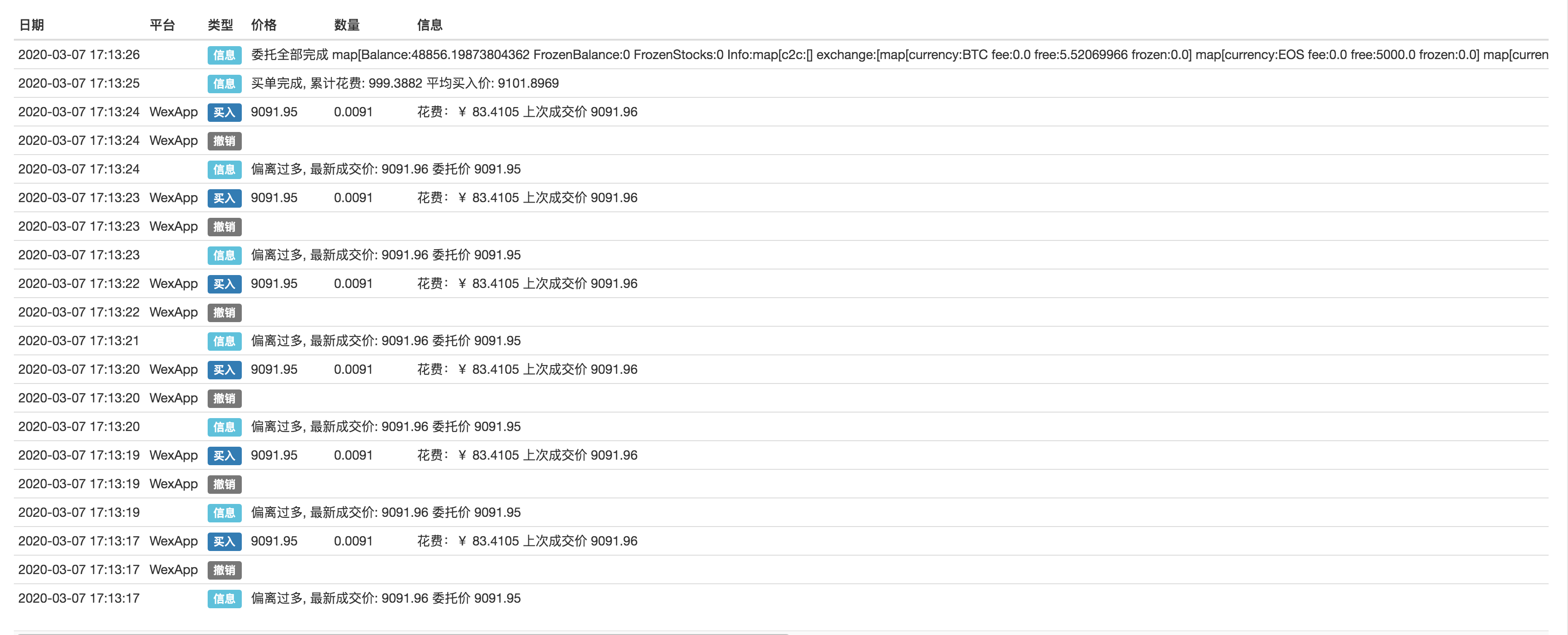पायथन संस्करण आइसबर्ग आयोग की रणनीति
लेखक:अच्छाई, बनाया गयाः 2020-07-21 10:21:10, अद्यतनः 2023-10-26 20:08:29
यह लेख प्रत्यारोपण के लिए दो क्लासिक रणनीतियों को लाता हैः आइसबर्ग कमीशन (खरीदें/बेचें) । रणनीति एफएमजेड प्लेटफॉर्म के आइसबर्ग कमीशन जावास्क्रिप्ट संस्करण से प्रत्यारोपित है। रणनीति का पता हैhttps://www.fmz.com/square/s:Iceberg/1
आइसबर्ग कमीशन ट्रेडिंग रणनीति परिचय के जावास्क्रिप्ट संस्करण का हवाला देते हुएः
आइसबर्ग कमीशन इस तथ्य को संदर्भित करता है कि जब निवेशक बड़े मूल्य के लेनदेन करते हैं, तो बाजार पर अत्यधिक प्रभाव से बचने के लिए, बड़े ऑर्डर कमीशन को स्वचालित रूप से कई कमीशन में विभाजित किया जाता है, जो वर्तमान नवीनतम खरीद / बिक्री 1 मूल्य और व्यापारी द्वारा निर्धारित मूल्य के आधार पर होता है। रणनीति स्वचालित रूप से एक छोटे आदेश को कमीशन करती है। जब अंतिम कमीशन पूरी तरह से लेनदेन किया जाता है या नवीनतम मूल्य वर्तमान कमीशन मूल्य से काफी भिन्न होता है, तो कमीशन ऑपरेशन स्वचालित रूप से फिर से शुरू हो जाता है।
कई एक्सचेंज ट्रेडिंग पेज आइसबर्ग कमीशन टूल के साथ आते हैं, जिनमें समृद्ध कार्य होते हैं, लेकिन यदि आप कुछ कार्यों को अनुकूलित करना चाहते हैं या अपनी आवश्यकताओं के अनुसार कुछ कार्यों को संशोधित करना चाहते हैं, तो आपको अधिक लचीले उपकरण की आवश्यकता होती है। एफएमजेड प्लेटफॉर्म को इस समस्या को सही ढंग से हल करने के लिए डिज़ाइन किया गया है। हमारे रणनीति वर्ग में बहुत अधिक पायथन ट्रेडिंग रणनीतियाँ नहीं हैं। कुछ व्यापारियों को जो व्यापार उपकरण और रणनीतियाँ लिखने के लिए पायथन भाषा का उपयोग करना चाहते हैं, उन्हें उदाहरणों का संदर्भ लेने की आवश्यकता है। इसलिए, क्लासिक आइसबर्ग कमीशन रणनीति को पायथन संस्करण में पोर्ट किया गया था।
पायथन के लिए आइसबर्ग आयोग - खरीद
import random # Import random number library
def CancelPendingOrders(): # The function of CancelPendingOrders is to cancel all pending orders of the current transaction.
while True: # Loop detection, call GetOrders function to detect the current pending order, if orders is an empty array, that is, len(orders) is equal to 0, indicating that all orders have been cancelled, you can exit the function and call return to exit.
orders = _C(exchange.GetOrders)
if len(orders) == 0 :
return
for j in range(len(orders)): # Traverse the current array of pending orders, and call CancelOrder to cancel the orders one by one.
exchange.CancelOrder(orders[j]["Id"])
if j < len(orders) - 1: # Except for the last order, execute Sleep every time and let the program wait for a while to avoid canceling orders too frequently.
Sleep(Interval)
LastBuyPrice = 0 # Set a global variable to record the the latest buying price.
InitAccount = None # Set a global variable to record the initial account asset information.
def dispatch(): # Main functions of iceberg commission logic
global InitAccount, LastBuyPrice # Reference global variables
account = None # Declare a variable to record the account information obtained in real time for comparison calculation.
ticker = _C(exchange.GetTicker) # Declare a variable to record the latest market quotes.
LogStatus(_D(), "ticker:", ticker) # Output time and latest quotation in the status bar
if LastBuyPrice > 0: # When LastBuyPrice is greater than 0, that is, when the commission has started, the code in the if condition is executed.
if len(_C(exchange.GetOrders)) > 0: # Call the exchange.GetOrders function to get all current pending orders, determine that there are pending orders, and execute the code in the if condition.
if ticker["Last"] > LastBuyPrice and ((ticker["Last"] - LastBuyPrice) / LastBuyPrice) > (2 * (EntrustDepth / 100)): # Detect the degree of deviation, if the condition is triggered, execute the code in the if, and cancel the order.
Log("Too much deviation, the latest transaction price:", ticker["Last"], "Commission price", LastBuyPrice)
CancelPendingOrders()
else :
return True
else : # If there is no pending order, it proves that the order is completely filled.
account = _C(exchange.GetAccount) # Get current account asset information.
Log("The buying order is completed, the cumulative cost:", _N(InitAccount["Balance"] - account["Balance"]), "Average buying price:", _N((InitAccount["Balance"] - account["Balance"]) / (account["Stocks"] - InitAccount["Stocks"]))) # Print transaction information.
LastBuyPrice = 0 # Reset LastBuyPrice to 0
BuyPrice = _N(ticker["Buy"] * (1 - EntrustDepth / 100)) # Calculate the price of pending orders based on current market conditions and parameters.
if BuyPrice > MaxBuyPrice: # Determine whether the maximum price set by the parameter is exceeded
return True
if not account: # If account is null, execute the code in the if statement to retrieve the current asset information and copy it to account
account = _C(exchange.GetAccount)
if (InitAccount["Balance"] - account["Balance"]) >= TotalBuyNet: # Determine whether the total amount of money spent on buying exceeds the parameter setting.
return False
RandomAvgBuyOnce = (AvgBuyOnce * ((100.0 - FloatPoint) / 100.0)) + (((FloatPoint * 2) / 100.0) * AvgBuyOnce * random.random()) # random number 0~1
UsedMoney = min(account["Balance"], RandomAvgBuyOnce, TotalBuyNet - (InitAccount["Balance"] - account["Balance"]))
BuyAmount = _N(UsedMoney / BuyPrice) # Calculate the buying quantity
if BuyAmount < MinStock: # Determine whether the buying quantity is less than the minimum buying quantity limit on the parameter.
return False
LastBuyPrice = BuyPrice # Record the price of this order and assign it to LastBuyPrice
exchange.Buy(BuyPrice, BuyAmount, "spend:¥", _N(UsedMoney), "Last transaction price", ticker["Last"]) # Place orders
return True
def main():
global LoopInterval, InitAccount # Refer to LoopInterval, InitAccount global variables
CancelPendingOrders() # Cancel all pending orders when starting to run
InitAccount = _C(exchange.GetAccount) # Account assets at the beginning of the initial record
Log(InitAccount) # Print initial account information
if InitAccount["Balance"] < TotalBuyNet: # If the initial assets are insufficient, an error will be thrown and the program will stop
raise Exception("Insufficient account balance")
LoopInterval = max(LoopInterval, 1) # Set LoopInterval to at least 1
while dispatch(): # The main loop, the iceberg commission logic function dispatch is called continuously, and the loop stops when the dispatch function returns false.
Sleep(LoopInterval * 1000) # Pause each cycle to control the polling frequency.
Log("委托全部完成", _C(exchange.GetAccount)) # When the loop execution jumps out, the current account asset information is printed.
पायथन के लिए आइसबर्ग आयोग - बिक्री
रणनीति का तर्क खरीद के समान है, केवल एक मामूली अंतर के साथ।
import random
def CancelPendingOrders():
while True:
orders = _C(exchange.GetOrders)
if len(orders) == 0:
return
for j in range(len(orders)):
exchange.CancelOrder(orders[j]["Id"])
if j < len(orders) - 1:
Sleep(Interval)
LastSellPrice = 0
InitAccount = None
def dispatch():
global LastSellPrice, InitAccount
account = None
ticker = _C(exchange.GetTicker)
LogStatus(_D(), "ticker:", ticker)
if LastSellPrice > 0:
if len(_C(exchange.GetOrders)) > 0:
if ticker["Last"] < LastSellPrice and ((LastSellPrice - ticker["Last"]) / ticker["Last"]) > (2 * (EntrustDepth / 100)):
Log("Too much deviation, the latest transaction price:", ticker["Last"], "Commission price", LastSellPrice)
CancelPendingOrders()
else :
return True
else :
account = _C(exchange.GetAccount)
Log("The buy order is completed, and the accumulated selling:", _N(InitAccount["Stocks"] - account["Stocks"]), "Average selling price:", _N((account["Balance"] - InitAccount["Balance"]) / (InitAccount["Stocks"] - account["Stocks"])))
LastSellPrice = 0
SellPrice = _N(ticker["Sell"] * (1 + EntrustDepth / 100))
if SellPrice < MinSellPrice:
return True
if not account:
account = _C(exchange.GetAccount)
if (InitAccount["Stocks"] - account["Stocks"]) >= TotalSellStocks:
return False
RandomAvgSellOnce = (AvgSellOnce * ((100.0 - FloatPoint) / 100.0)) + (((FloatPoint * 2) / 100.0) * AvgSellOnce * random.random())
SellAmount = min(TotalSellStocks - (InitAccount["Stocks"] - account["Stocks"]), RandomAvgSellOnce)
if SellAmount < MinStock:
return False
LastSellPrice = SellPrice
exchange.Sell(SellPrice, SellAmount, "Last transaction price", ticker["Last"])
return True
def main():
global InitAccount, LoopInterval
CancelPendingOrders()
InitAccount = _C(exchange.GetAccount)
Log(InitAccount)
if InitAccount["Stocks"] < TotalSellStocks:
raise Exception("Insufficient account currency")
LoopInterval = max(LoopInterval, 1)
while dispatch():
Sleep(LoopInterval)
Log("All commissioned", _C(exchange.GetAccount))
रणनीतिक संचालन
विनिमय परीक्षण का अनुकरण करने के लिए WexApp का उपयोग करेंः
खरीदना:

बिक्रीः

रणनीति तर्क जटिल नहीं है। जब रणनीति निष्पादित की जाती है, तो यह गतिशील रूप से रणनीति मापदंडों और वर्तमान बाजार मूल्य के आधार पर आदेश रखेगा और रद्द कर देगा। जब लेनदेन राशि / सिक्का संख्या पैरामीटर सेटिंग संख्या तक पहुंचती है या उसके करीब आती है, तो रणनीति बंद हो जाती है। रणनीति कोड बहुत सरल और शुरुआती लोगों के लिए उपयुक्त है। इच्छुक पाठक इसे संशोधित कर सकते हैं और अपनी ट्रेडिंग शैली के अनुरूप रणनीति डिजाइन कर सकते हैं।
- डीईएक्स एक्सचेंजों का मात्रात्मक अभ्यास (2) -- हाइपरलिक्विड यूजर गाइड
- DEX एक्सचेंज क्वांटिफाइंग प्रैक्टिस ((2) -- हाइपरलिक्विड उपयोग गाइड
- डीईएक्स एक्सचेंजों का मात्रात्मक अभ्यास (1) -- dYdX v4 उपयोगकर्ता गाइड
- क्रिप्टोकरेंसी में लीड-लैग आर्बिट्रेज का परिचय (3)
- DEX एक्सचेंज क्वांटिफाइड प्रैक्टिस ((1)-- dYdX v4 उपयोग गाइड
- डिजिटल मुद्रा में लीड-लैग सूट का परिचय (3)
- क्रिप्टोकरेंसी में लीड-लैग आर्बिट्रेज का परिचय (2)
- डिजिटल मुद्राओं में लीड-लैग सूट का परिचय (2)
- एफएमजेड प्लेटफॉर्म के बाहरी सिग्नल रिसेप्शन पर चर्चाः रणनीति में अंतर्निहित एचटीपी सेवा के साथ सिग्नल प्राप्त करने के लिए एक पूर्ण समाधान
- एफएमजेड प्लेटफॉर्म के लिए बाहरी सिग्नल प्राप्त करने का अन्वेषणः रणनीति अंतर्निहित एचटीटीपी सेवा के लिए सिग्नल प्राप्त करने के लिए पूर्ण समाधान
- क्रिप्टोकरेंसी में लीड-लैग आर्बिट्रेज का परिचय (1)
- ट्रेडिंग रणनीति में एक अलार्म घड़ी जोड़ें
- सी++ का उपयोग करके ओकेएक्स वायदा अनुबंध हेजिंग रणनीति
- सक्रिय धन प्रवाह पर आधारित व्यापारिक रणनीति
- मैनुअल ट्रेडिंग की सुविधा के लिए ट्रेडिंग टर्मिनल प्लग-इन का प्रयोग करें
- मात्रात्मक टाइपिंग दर व्यापार रणनीति
- संतुलन रणनीति और ग्रिड रणनीति
- बहु-रोबोट बाजार उद्धरण साझा समाधान
- रोबोट वीचैट संदेश पुश कार्यान्वयन योजना
- संतुलन रणनीति और ग्रिड रणनीति का विवरण
- ग्राफिकल मार्टिंगेल ट्रेडिंग रणनीति
- क्रिप्टो मुद्रा वायदा व्यापार का तर्क
- नीचे का आकार ZDZB रणनीति
- मल्टी-रोबोट बाजार साझा समाधान
- ARMA-EGARCH मॉडल के आधार पर बिटकॉइन की अस्थिरता का मॉडलिंग और विश्लेषण
- जावास्क्रिप्ट रणनीति डिजाइन में संख्यात्मक गणना सटीकता समस्या का समाधान
- एक स्थानीय फ़ाइल में पायथन रणनीति को कैप्सूल करने के लिए आप सिखाएँ
- एफएमईएक्स ट्रेडिंग से ऑर्डर वॉल्यूम का अनुकूलन होता है भाग 2
- एफएमईएक्स ट्रेडिंग ऑर्डर वॉल्यूम अनुकूलन को अनलॉक करती है
- कमोडिटी फ्यूचर्स वॉल्यूम फुटप्रिंट चार्ट का विश्लेषण और निष्पादन
- एफएमईएक्स क्रमबद्ध अनलॉक अधिकतम न्यूनतम मात्रा अनुकूलन